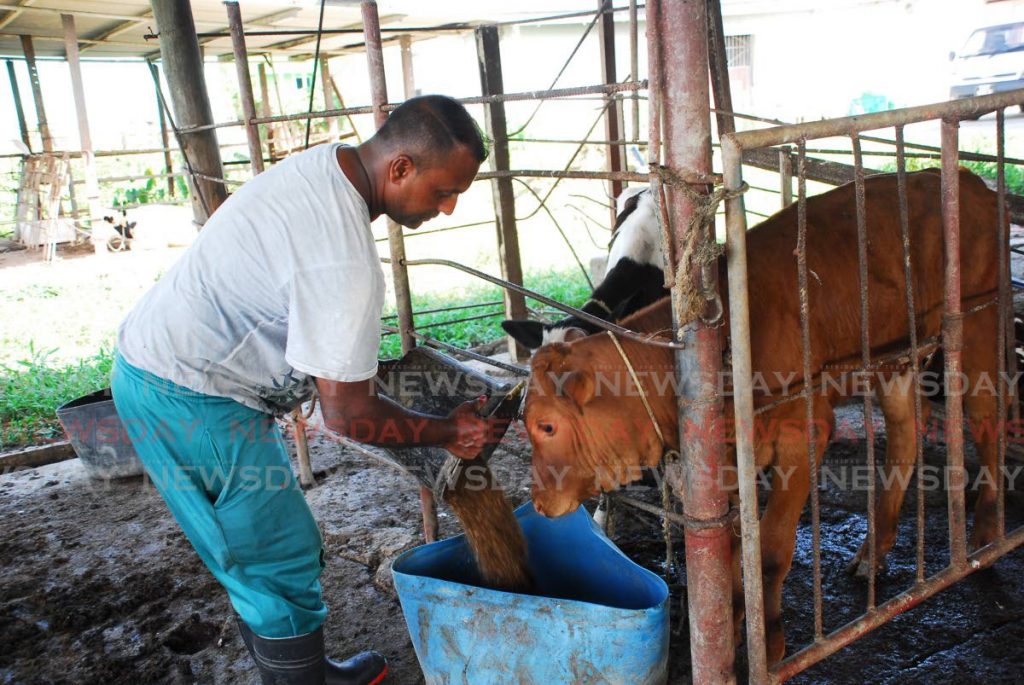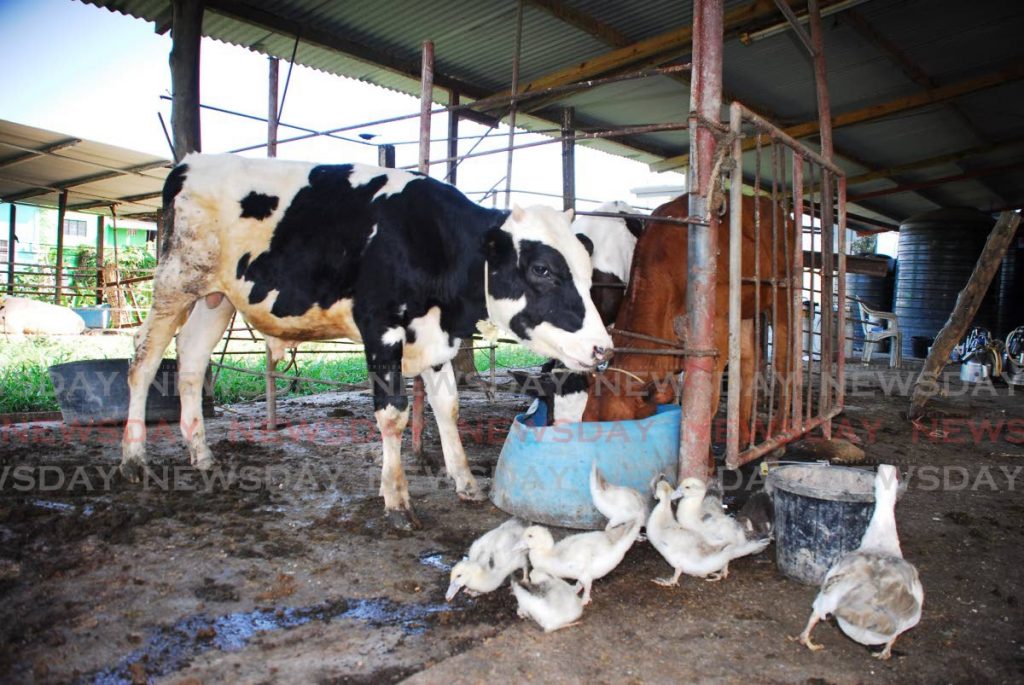Dairy farmers on the brink, numbers dwindle owing to high costs

If the dairy industry crashes, so too will the fresh beef market.
Dairy farmers from Turure, Wallerfield, Carlsen Field and Waterloo are on the brink of giving up.
High feed prices, high labour costs and other farm expenses have left many in the red and the only way for them to survive is finding alternative means of income.
Farmers usually cull cows when the milk production is no longer feasible and sell young bulls to the butchers. Few keep adult bulls on their farms because of the inherent danger of being attacked.
Over the last two weeks, Sunday Newsday spoke to farmers across the country on how they plan to meet the challenges ahead.
Some of them were not willing to speak on the record fearing backlash from the Ministry of Agriculture and Nestle – the Switzerland-based company which purchases the bulk of raw milk from farmers.
"There is no future in dairy farming," says farmer Rishi Moonie, of Waterloo.
Moonie, who has been operating his farm for the last 28 years, has a herd of 100 cows.
Last October, Nestle discontinued purchasing milk from him on the basis that he was unable to satisfy the quality demands.
Moonie ran the farm with the help of his father and brother. But after his father died last year, his brother moved on to another business. He says he cannot manage the farm by himself and cannot afford to hire more help, except for one Venezuelan migrant worker.
Luckily, he has found another market for the 12 churns of milk he produces daily. Venezuelan migrants are using it to make cheese.
On the other end of the island, a Turure farmer who tried to reduce the cost of rations by planting corn and mulatto grass ended up with significant losses as both crops became water-logged in the rainy season and perished.
With 48 years experience, the farmer does not intend to give up and plans to try again to make silage for the cows – a mixture of corn, molasses and rock salt.
Like many others across the country, the Turure dairy farmer started the farm in early 1960s and sold almost all of the milk produced at the farm to Nestle.
The farmer said while Nestle has assisted in providing training and some machinery to help improve the production, more needs to be done to keep the industry afloat.
There were 30 farmers who started in Turure but there are only 14 left. Some of them abandoned their farms, now taken over by squatters or sub-leased to vegetable farmers.
Others are yet to get their leases renewed for the land they occupy and the state has been moving to evict those who are not using it for the purpose of dairy farming.
The farmer suggested that the government work the dairy farmers who are still interested in the industry and give them the option to pasteurise their own milk or to make cheese and yoghurt.
In Wallerfield, illegal quarry operators have even encroached on dairy farms and they too have to fight off squatters.

PHOTOS BY DARREN BAHAW -
Sunday Newsday also reached out the Nestle to find out how the company has been helping to assist local farmer develop best practices at their farms and what new technologies have been introduced?
The company said it had a long history with local farmers, which began in 1962, after then prime minister Dr Eric Williams asked the company to help build a dairy industry in TT.
"With established milk collection centres and a manufacturing plant which receives, processes and packages local fresh milk, Nestle continues to remain committed to the success of the dairy industry," it said.
Nestle invests $10.5m in 3 years
Over the last three years, the company said it had invested almost $10.5 million in the dairy industry.
"In 2008, Nestle established a Dairy Development Programme in order to positively impact both milk production and quality across Trinidad. This programme, which has been implemented across 42 farms nationwide to date, focuses on improving four key areas of forage and feeding, animal health, fertility and farmers’ entrepreneurial skills. Through this programme, Nestle provides local dairy farmers with veterinary services, artificial insemination and pregnancy diagnosis with a focus on improving herd genetics and fertility management."
As part of that programme, the company introduced a corn silage initiative between 2018-2019 investing in the implementation of equipment, training and technical support from veterinary and agricultural specialists bringing experts from other markets, with the aim of providing farmers with the technology and skills required to assure the long term availability of fodder for their dairy herds.
The company said it also provides 16 per cent crude protein concentrate ration at cost price to farmers, selling approximately 150 bags per week.
During the period of a feed shortage starting in December 2020, the company said it increased its purchase of rations in order to assist their farmers.
Its agricultural services team has quarterly training with farmers on methodologies to improve milk quality and milk productivity and company officials routinely visit farmers to ensure the milk is of the best standard and suggest ways to improve the quality, the company said.
There are currently 105 farmers registered to supply fresh milk with Nestle and the average quantum is 5,000 litres a day, which amounts to 86 per cent of all the local milk produced in Trinidad.
In 1995, the average output from dairy farmers to Nestle was almost 25,000 litres a day.
"We acknowledge that liquid milks are currently being imported into the country without sufficient regulation to protect the local dairy industry thereby resulting in decreased competitiveness and reduced incentive to invest locally. Through our continued interaction with dairy farmers, it is also apparent that their challenges within the industry are centred on the following issues; the cost of production – impacted by the cost of labour and raw materials – land tenure issues and an ageing farmer population with insufficient upcoming talent," the company stated were some of the reasons for the drastic decline.
It listed ways in which the industry can be sustained.
"As evidenced in our Dairy Development Programme, Nestle recognises that four key areas need to be developed within the farming industry in order to sustain and expand a progressive agenda. The methodologies and technical approach recommended by Nestle, supports the growth and sustainability of the industry through a focus on herd health, improving milk productivity and quality and thereby creating a higher demand for the product. Also, farmers should focus on creating a long term and sustainable source of fodder for their dairy herds. The production and use of corn silage – which is a global best practice – provides a relevant and sustainable alternative to the traditional grazing approach for animal consumption.
"Partnered with the above, to revitalise the dairy industry and stimulate investment, we require national discussion and action from key stakeholders in the public and private sector with a focus on making the industry more competitive."
Asked what can be done to encourage more farmers to join the dairy industry, the company said it was important to stimulate growth through internships and entrepreneurial support for people wishing to enter the industry.
The company has an internship programme which began two years ago and it intends to continue to contribute to the "pipeline of young dairy farmers and agripreneurs."


Comments
"Dairy farmers on the brink, numbers dwindle owing to high costs"